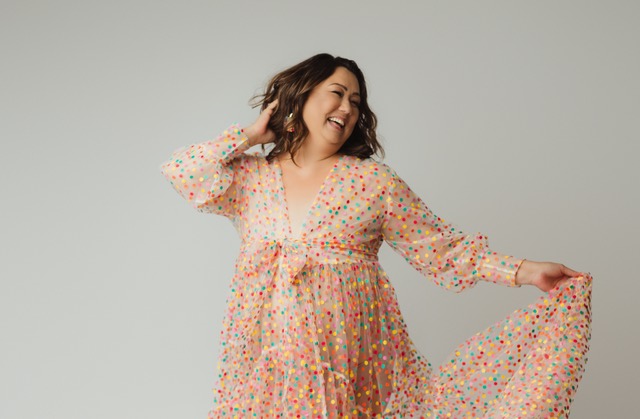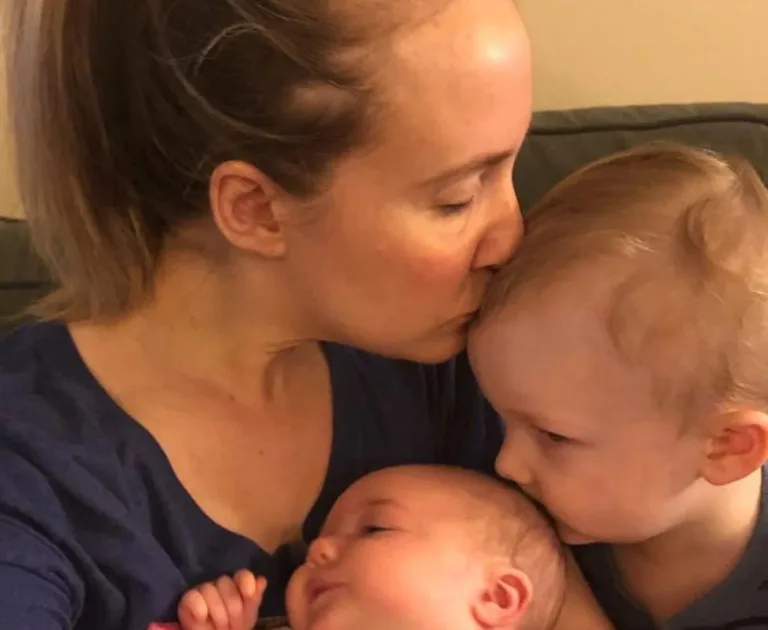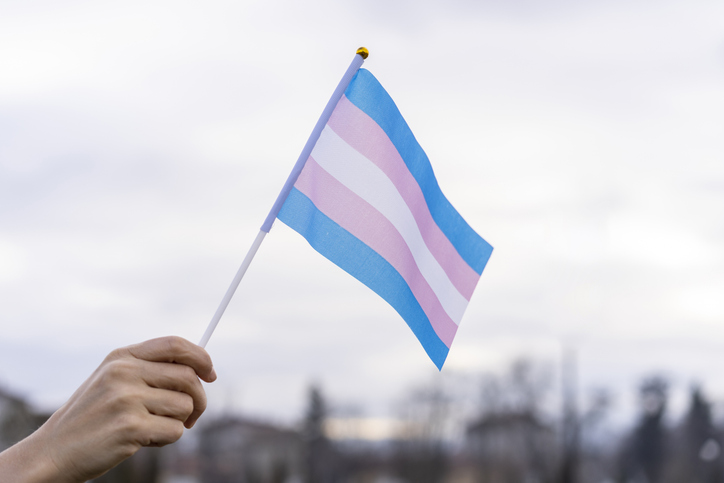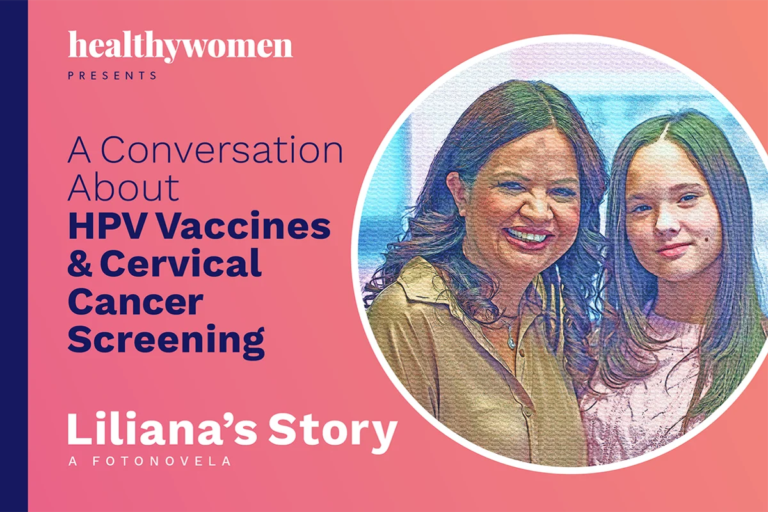As told to Erica Rimlinger
It was deployment day, and my husband and I were awake long before dawn to get ready. After I hurried through my shower, I caught sight of something strange in the mirror. A patch of skin under my left breast looked like it had been burned. The mark was distinct, and I knew it wasn’t there yesterday.
Through the rush of getting out the door and saying goodbye to me and our two kids — who were then ages 6 and 12 — my husband made a point to say to me, “Get that checked out by your doctor. Please, go today.”
I did, and my doctor found three masses in that breast. She said she was sending me right away for a mammogram, MRI and biopsy at a civilian hospital that provided those services. At age 39, with no history of cancer in my family, I’d never even had a mammogram before.
Deployment day was always busy and emotional and required the family to realign into a single-parent unit. I was used to making this adjustment, but the suggestion that I might have cancer was too much life-altering change for one person to handle in one day. I wanted to call my husband for support, but he was in transit and unreachable for 24 to 48 hours.
In 2013, soldiers didn’t have regular cell phone access. They stood in line to call home once a day. I anticipated his daily call to give him updates when the kids were out of earshot. I had to wait longer than two weeks for the results of my punch biopsy, so every day I reported to my husband, “Not yet.”
The results of my biopsy finally arrived minutes after our daily phone call. I burst into tears and knew I’d have to wait another 24 hours to tell my husband about the war that had just begun at home.
I worked full time, and the kids filled the rest of my time with school, band practice, dance and lessons. We were busy, but we had a routine. That routine was about to collide with an immediate and aggressive course of chemotherapy for my stage 2 breast cancer. I had to put on a strong front for the kids, but inside I was terrified.
The Army sent my husband home on leave to help us deal with the crisis. The weather didn’t cooperate during his long journey home, and he ended up being rerouted to Houston, a few hours away. I drove to meet him there, and when I embraced him at the airport, I was able to truly feel supported for the first time. I wouldn’t have to fight this war alone.
My first chemotherapy treatment — doxorubicin, known as the infamous “Red Devil” — caused such a bad reaction I had to stop treatment and restart later. But chemo was just one part of the battle our lives had become. I had also stopped working at this point and had to adjust from going from a two-income household to one income. We had just purchased a new home before I was diagnosed, and our mortgage was based on us having two salaries — and, obviously, no stacks of new medical bills.
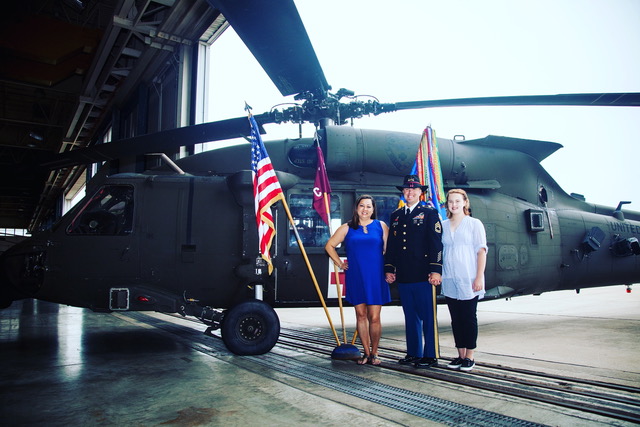
We had always been careful with our finances and lived within our means, but we suddenly found our family in financial straits. As a military spouse who had also grown up in a military family, I was accustomed to coping with new circumstances with resilience. We didn’t ask for help. For the first time ever, we worried about the cost of gas with my new 45-minute daily commute to the treatment facility. We worried how to feed the family. But we didn’t qualify for free food programs at school. We worried daily about going bankrupt and losing our house.
Fortunately, we had a community of supporters around us who rallied to help us through random acts of kindness, large and small. After my chemotherapy, a double mastectomy and a hysterectomy were behind us, the support — what I called the “cancer confetti” — went away, but the financial and physical aftershocks didn’t.
Our family’s cancer story didn’t end there. My mom, who was also a military spouse, was diagnosed with the same kind of breast cancer a few years after mine. While my mom was battling cancer, I found another lump — in the chest wall in the same spot where my previous tumors had been found — and I was re-diagnosed with cancer myself. Although genetic testing didn’t identify a specific cancer gene in either of us, I wonder if a genetic link just hasn’t been discovered yet.
My husband was, once again, deployed during this time. I had to cobble together childcare for the kids while planning and undergoing explant surgery and radiation and traveling to Georgia to be there for my mom, who was in hospice by then. This time, the Army delayed my husband’s return.
Dealing with the financial burden on top of the sickness, medical complications and fear gave me the idea to ensure others didn’t have to go through this — and to pay forward the help I had received. I started a nonprofit called Pink Warrior Angels to provide real, tangible help to military families when they need it most.
Pink Warrior Angels provides upfront grants to cancer warriors who are used to supporting their own warriors. We organize real help for all the tasks that fall through the cracks during a cancer battle, such as picking up kids at the bus stop and mowing the lawn. We educate military spouses about navigating the military health system, and how to advocate for getting second opinions and finding the right care for an individual situation, whether it’s at a military base or civilian. We also provide support for spouses.
I’ve learned so many lessons during this experience, and I want to pass on what I’ve learned: Mainly, that when military families are forced to fight battles on multiple fronts, we can only win the war when we’re fighting together.
This educational resource was created with support from AstraZeneca.
Have a Real Women, Real Stories of your own you want to share? Let us know.
Our Real Women, Real Stories are the authentic experiences of real-life women. The views, opinions and experiences shared in these stories are not endorsed by HealthyWomen and do not necessarily reflect the official policy or position of HealthyWomen.


